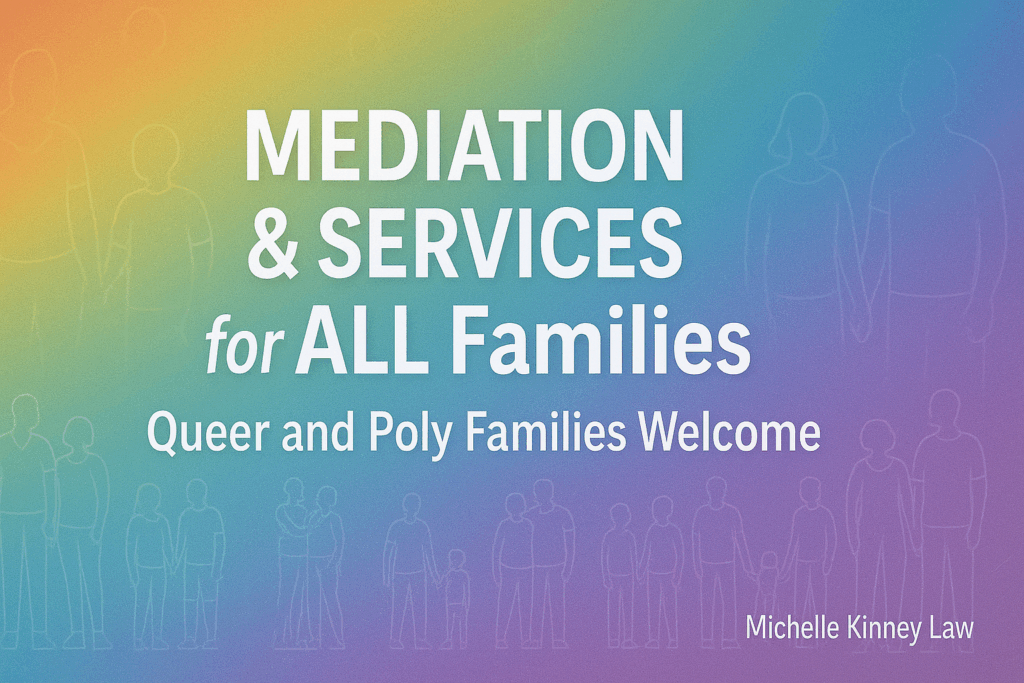By Michelle Kinney, Family and Fertility Lawyer & Mediator

Celebrating, Honoring and Respecting Diverse Families
June is Pride Month—a time to honour the resilience and diversity of 2SLGBTQIA+ communities and to recognize that families come in many beautiful forms. Queer parents, co-parents, donors, multiparent households, and chosen families often face unique legal and emotional challenges when relationships shift. Mediation can meet those needs head-on by offering an affirming, collaborative space where everyone’s identity and family structure are respected.
Why Queer-Friendly Legal Services and Mediation Matters
1. Affirmation & Safety
As mediator and a fertility lawyer, who identifies as queer and raised a child as a single parent in “Gay-land”, I understands diverse family constellations, know the importance of using correct names and pronouns, and am positioned to ensure psychologically safe conversations. My intake forms all include questions about prefered names and pronouns so that is on the table right from start.
2. Privacy & Mediation
- Sensitive topics—parentage and family building including through assisted reproduction, donor agreements, gender-affirming care, non-traditional relationships, as well as heartbreaks and relationship breakdown—stay confidential, not part of a public court record thorugh mediation.
3. Customized Solutions
- Courts may apply rigid “traditional” templates; mediation lets parties craft creative plans that reflect real-life schedules, multi-parent dynamics, and cultural or community needs, with a focus on the interests of the parties. To get tailored, workable and practical soultions everyone can live with.
4. Preservation of Chosen-Family Ties
- Agreements can safeguard important non-biological bonds—like aunties, uncles, or donor-siblings—so children keep the broad support network that makes queer families thrive, while protecting parents ability to make choices and decisions in their child’s best interest.
5. Mediation AND Legal Information
I am a mediator and arbitrator certified by the Law Society Of BC. AND I am also a family lawyer. I therefore provide the added benefit of indepth legal information so you know what the law says and can make informed decisions when making mediated agreements.
Why I Believe in Mediation
When families face separation, parenting disagreements, or other emotionally charged transitions, the courtroom can feel like the only path forward. In reality, litigation is often slow, expensive, and adversarial—exactly the opposite of what most families need. I truly think court is the WORST place for families, while recognizing that it is required as a last resort in some circumstances. Mediation offers a different way: a confidential, solution-focused process that puts decision-making back in your hands.
What Is Family Mediation?
Mediation is a voluntary, out-of-court process where a neutral professional (that’s me!) facilitates productive conversations between the parties. Together, we identify the issues, explore interests, and craft durable agreements on everything from parenting schedules to property division. Because the parties control the outcome, solutions can be more creative, practical, and sustainable than those imposed by a judge.
Key Benefits
- Cost-Effective – Mediation is almost always less expensive than litigation, freeing resources for your family’s future rather than legal fees.
- Time-Efficient – Sessions are scheduled on your timetable; most files resolve in weeks, not years.
- Confidential – Discussions stay private, preserving your dignity and family relationships.
- Child-Centred – We keep kids’ best interests front and centre, reducing the stress they experience when parents battle in court.
- Relationship-Preserving – By focusing on respectful dialogue and shared goals, mediation sets the stage for healthier co-parenting long after the legal file closes.
My Mediation Process at Michelle Kinney Law
| Step | What Happens | Your Take-Away |
|---|---|---|
| 1. Intake & Screening | Separate, confidential meetings to understand goals, power dynamics, and any safety concerns. | You’ll know whether mediation is appropriate and feel safe to speak freely. Screening includes identifying prefered pronouns and names. |
| 2. Agenda Setting | Together we list all topics to resolve: parenting, support, property, or a single issue. | A clear roadmap keeps sessions focused and efficient. |
| 3. Information Exchange | Full financial disclosure and gathering of any parenting or support documents. | Transparency builds trust and protects agreements from future challenge. |
| 4. Negotiation Sessions | Guided conversations (in joint or separate “shuttle” rooms) where we identify interests, brainstorm options, and evaluate solutions. | You craft outcomes tailored to your family’s real-world needs. Trauma-informed facilitation and queer-competent language keep discussions respectful. |
| 5. Draft Agreement | I prepare a memorandum of understanding (a summary of agreements) you can each review with independent legal advice. I can then draft these terms into a legally binding Separation Agreement. | You leave with a clear, plain language, inclusive and enforceable agreement—no surprises. |
My Approach: Inclusive, Trauma-Informed, Practical
- Inclusive & LGBTQ2S+-Affirming – Every family structure is welcome, whether blended, polyamorous, or chosen family.
- Trauma-Informed – I recognize how past experiences shape conflict and ensure the space is emotionally safe.
- Plain-Language Agreements – Legal clarity without jargon, so you understand every clause you sign.
- Remote & In-Person Options – Based in Victoria, BC, I offer secure video mediation for clients across Canada’s time zones- including in Nunavut, the Northwest Territories and the Yukon.
- Family-Law Focus – Over a decade dedicated to family relationships, fertility law, and parenting arrangements.
- Balanced Perspective – As both a litigator and mediator, I know the court system’s limits—and how to avoid them.
- Express Mediation Service – For straightforward matters, resolve key issues in a single day.
- Transparent Pricing – Flat-fee packages and hourly rate options keep costs predictable.
Ready to Begin?
If you’re looking for a respectful, creative and relationship/child-centred way to move forward, mediation could be the cooperative separation solution you’ve been searching for. Contact me for more information at michellekinneylaw.com/contact. Let’s chart a calmer path—together.
Michelle Kinney is a family and fertility lawyer, mediator, and advocate for inclusive, accessible justice. She serves clients in Victoria, Vancouver Island and all of British Columbia, and remotely in Nunavut, the Northwest Territories and the Yukon.